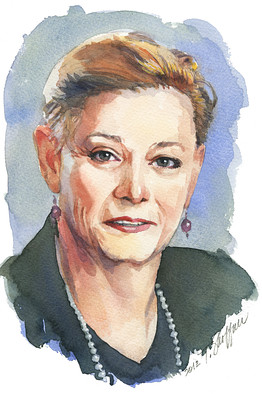Liberty Matters
Changing Ideas Is Tougher than Changing Institutions
 There’s much to say, but I content myself here to make only two brief points.
There’s much to say, but I content myself here to make only two brief points.First, at the end of his most-recent comment ("Which Came First: Ideas or Growth?"), John says that "I [John] deeply want to believe that ideas were the key element in the Industrial Revolution. Promoting reform would actually become easier."
I disagree. I suspect that the importance of ideas does not make the promotion of reform easier – or, at any rate, it doesn't make actual reform easier.
I think I understand what John means, and this point is indeed important: if ideas really do matter, it is then at least possible to loosen the choking grip of special-interest groups on the throat of the body-economic. Not so in the idea-impotent world as seen, for example, by George Stigler. There, there is no hope. There, there is in play only the inexorable logic of interest-group politics, rational ignorance, and other collective-action ailments causing governments -- barring some happy exogenous changes in constraints – to grow in economically destructive ways.
So, yes, if ideas matter then society isn't destined to be impoverished by rent-seeking interest groups. Genuine reform is possible. But easier? Changing dominant ideas, it seems to me, is far more difficult than changing institutions. And any such change in ideas takes more time, too.
This reality relates to my second point. Hernando de Soto famously calls for the governments of developing countries not only to make poor people's property rights in their land and small buildings more secure, but also to memorialize those rights in formal titles of the sort that are prevalent in developed countries. Poor people can then use those formal titles as collateral for loans to start and expand businesses. Enterprise will flourish. Or so De Soto argues.[30]
It's a nice story, but it doesn't work so well in practice. The reason is that ideas prevalent on the ground in many developing countries make it very difficult to transform land titles into collateral. I'm told by reliable on-the-ground researchers in sub-Saharan Africa that many poor people there hold strong beliefs that their land is something that simply should not be traded in commercial markets or used as collateral for loans. Also, banks remain reluctant to foreclose on loans that are in default because they fear strong popular opposition to such foreclosures; banks, therefore, are reluctant to make such secured loans in the first place. [31]
Changing the institution here is rather easy: create a system of formal titling. Western experts are available for hire to help get the institutional details just right! Changing the ideas that people have about their and their neighbors' relationship with land and about the proper and improper uses of land is far more difficult. No western experts can help here.
Endnotes
[30.] Hernando de Soto, The Mystery of Capital (New York: Basic Books, 2000).
[31.] See Karol C. Boudreaux, "The Legal Empowerment of the Poor: Titling and Poverty Alleviation in Post-Apartheid South Africa," Hastings Race and Poverty Law Journal, Vol. 5, 2008, pp. 309-37. See also Karol Boudreaux and Paul Dragos Aligica, Paths to Property: Approaches to Institutional Change in International Development (London: Institute of Economic Affairs, 2007).
Copyright and Fair Use Statement
“Liberty Matters” is the copyright of Liberty Fund, Inc. This material is put on line to further the educational goals of Liberty Fund, Inc. These essays and responses may be quoted and otherwise used under “fair use” provisions for educational and academic purposes. To reprint these essays in course booklets requires the prior permission of Liberty Fund, Inc. Please contact oll@libertyfund.org if you have any questions.